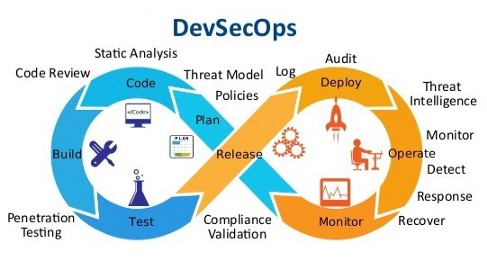

Zeufi
DevSecOps
DevSecOps is a trending practice in application security (AppSec) that involves introducing security earlier in the software development life cycle (SDLC). It also expands the collaboration between development and operations teams to integrate security teams in the software delivery cycle. DevSecOps requires a change in culture, process, and tools across these core functional teams and makes security a shared responsibility. Everyone involved in the SDLC has a role to play in building security into the DevOps continuous integration and continuous delivery (CI/CD) workflow.
What is DevOps?DevSecOps evolved to address the need to build in security continuously across the SDLC so that DevOps teams could deliver secure applications with speed and quality. Incorporating testing, triage, and risk mitigation earlier in the CI/CD workflow prevents the time-intensive, and often costly, repercussions of making a fix postproduction. This concept is part of “shifting left,” which moves security testing toward developers, enabling them to fix security issues in their code in near real time rather than “bolting on security” at the end of the SDLC. DevSecOps spans the entire SDLC, from planning and design to coding, building, testing, and release, with real-time continuous feedback loops and insights.
is an approach to software development that centers on three pillars—organizational culture, process, and technology and tools. All three are geared toward helping development and IT operations teams work collaboratively to build, test, and release software in a faster, more agile, and more iterative manner than traditional software development processes.
According to , “In the DevOps ideal, developers receive fast, constant feedback on their work, which enables them to quickly and independently implement, integrate, and validate their code, and have the code deployed into the production environment.”
In simple terms, DevOps is about removing the barriers between two traditionally siloed teams. In a DevOps model, development and operations teams work together across the entire software application life cycle, from development and testing through deployment and operations.
How is DevOps different from DevSecOps?Modern software development leverages an to accelerate the development and delivery of software releases, including updates and fixes. DevOps and DevSecOps use the agile framework for different purposes. DevOps focuses on the speed of app delivery, whereas DevSecOps augments speed with security by delivering apps that are as secure as possible as quickly as possible. The goal of DevSecOps is to promote the fast development of a secure codebase.
Core to DevSecOps is integrating security into every part of the SDLC—from build to production. In DevSecOps, security is the shared responsibility of all stakeholders in the DevOps value chain. DevSecOps involves ongoing, flexible collaboration between development, release management (or operations), and security teams. In short, DevOps focuses on speed; DevSecOps helps maintain velocity without compromising security.
Why is DevSecOps important?Ultimately, DevSecOps is important because it places security in the SDLC earlier and on purpose. When development organizations code with security in mind from the outset, it’s easier and less costly to catch and fix vulnerabilities before they go too far into production or after release. Organizations in a variety of industries can implement DevSecOps to break down silos between development, security, and operations so they can release more secure software faster.
Which application security tools are used in DevSecOps?To implement DevSecOps, organizations should consider a variety of application security testing (AST) tools to integrate within various stages of their CI/CD process. Commonly used AST tools include .
.
.
.
How are AST tools integrated in DevSecOps?Although AST tools are useful for identifying vulnerabilities, they can also add complexity and slow down software delivery cycles. Sorting through an overwhelming number of findings from siloed tools without the means to understand what needs to be done to prioritize them or when it is necessary to test can cause significant friction for security and development teams.
Optimizing testing tools and deriving meaningful insight from their data requires an (ASOC) solution. ASOC tools combine the capabilities of (ASTO) and application vulnerability correlation (AVC) tools to provide a management framework for AppSec tools, workflows, and prioritization of security activities. An effective ASOC tool is key to DevSecOps because it enables security and development teams to orchestrate testing intelligently, consolidate data from all AST tools, deduplicate any redundant results, correlate this data based on threat intelligence, and contextualize software risk to prioritize critical findings.
Together, Synopsys Intelligent Orchestration and Code Dx® provide an ASOC solution that integrates within the SDLC to mitigate software risk and build security into DevOps. Intelligent Orchestration enables organizations to determine the most impactful security activities by assessing the criticality of applications, defining application security policies as code, and using that policy to evaluate code changes and other SDLC events to trigger appropriate testing. It is an ASTO solution that, when combined with an AVC solution like Code Dx , provides a holistic ASOC approach. Code Dx integrates across 100+ developer and AST tools to consume, normalize, and correlate application security data, prioritize key findings, coordinate remediation workflows, and provide visibility to stakeholders across development and security. Importantly, Intelligent Orchestration and Code Dx support bidirectional integrations with a variety of ticketing systems to enable continuous feedback loops and communicate defects or security activities with developers directly. This provides a necessary foundation for organizations to bridge process gaps, facilitate collaboration between stakeholders across security and development, and fully migrate to DevSecOps.
Zeufi
Zeufi helps aspiring developers reach new heights.